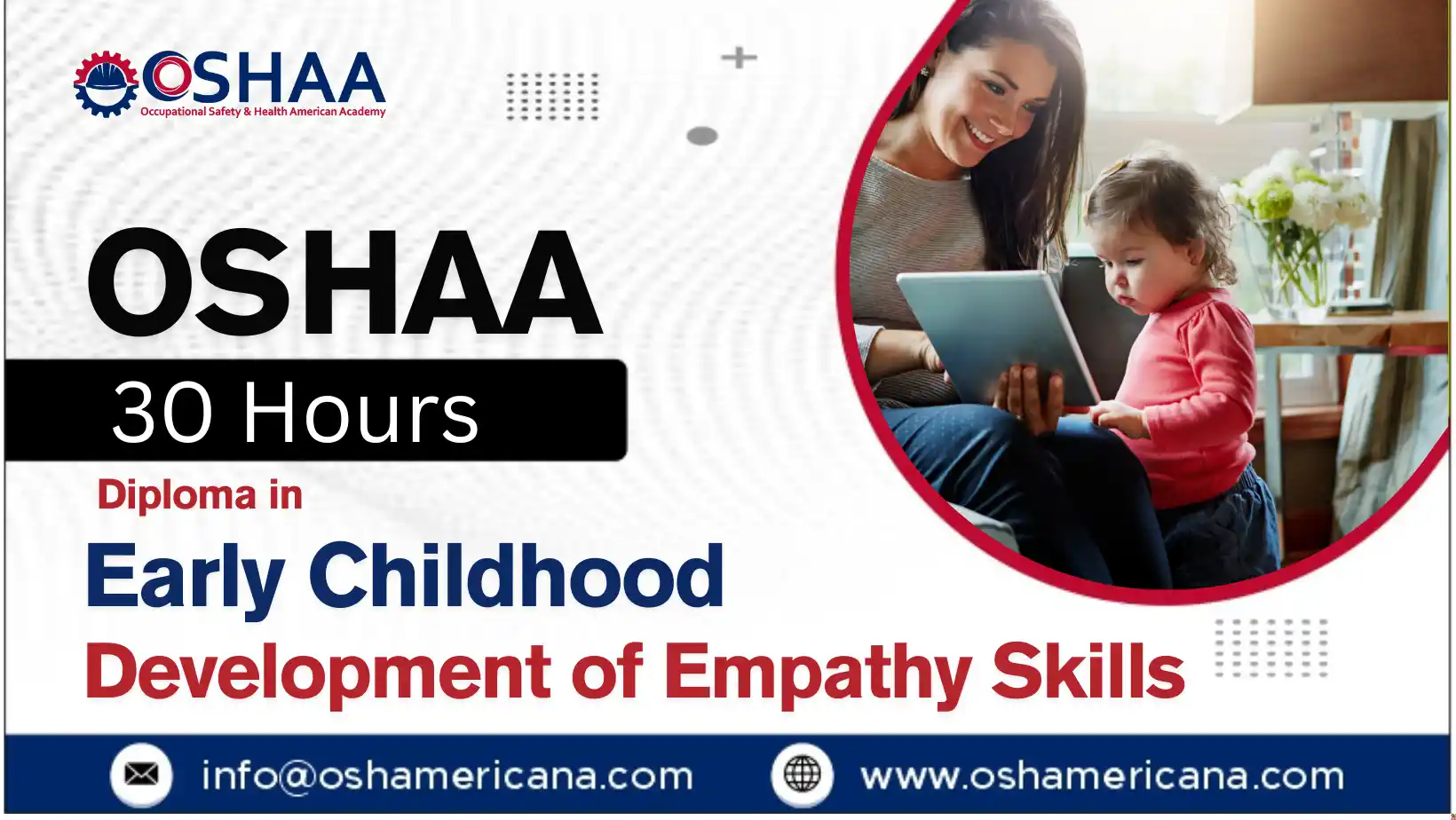The OSHA 30-Hours Diploma in Early Childhood Development of Empathy Skills is a specialised programme designed to equip participants with the tools and strategies needed to foster empathy in young children. In an increasingly complex world, the development of emotional intelligence has become a key priority in early education, and this diploma addresses that need through a structured, evidence-based approach.
Empathy is a fundamental human skill that enables children to understand, relate to, and care about others. It plays a crucial role in social development, peer relationships, and long-term mental well-being. This diploma is specifically tailored for participants involved in early years education, childcare, or related fields, offering them practical guidance on nurturing empathy during the most formative stages of a child’s life.
Delivered through interactive modules and practical case studies, the diploma offers both theoretical knowledge and applied strategies. Participants gain insight into child psychology, behavioural cues, and the social dynamics that shape empathy in early years. This hands-on approach ensures that learning is immediately relevant and transferable to real-world early learning environments.
The OSHA 30-Hours Diploma in Early Childhood Development of Empathy Skills is an essential qualification for those committed to raising emotionally intelligent, socially aware children. Whether working in nurseries, early years centres, or community programmes, participants will leave this course equipped to make a lasting, positive impact in the lives of the children they support.
OSHAA 30-Hours Diploma in Early Childhood Development of Empathy Skills
Study Units
Learning Outcomes
Introduction to Empathy in Early Childhood Development (3 Hours)
- Define empathy and explain its importance in early childhood
- Understand how empathy influences social and emotional development
- Recognise the early signs of empathy in children
- Explore the developmental stages where empathy begins to emerge
Understanding Emotional Intelligence in Young Children (6 Hours)
- Identify the components of emotional intelligence in early years
- Understand the relationship between emotional awareness and empathy
- Recognise emotional expressions and responses in young children
- Support the development of self-awareness, self-regulation, and social skills
- Apply techniques to guide children in understanding their own and others’ feelings
Role of Early Educators in Modelling Empathy (3 Hours)
- Understand the impact of role modelling on children’s emotional behaviour
- Demonstrate empathetic responses in various educational scenarios
- Reflect on personal attitudes and behaviours that influence children’s development
- Foster positive adult-child interactions that encourage empathy
Creating Emotionally Supportive Learning Environments (4 Hours)
- Design early learning spaces that promote emotional security and empathy
- Implement routines and practices that support emotional well-being
- Identify environmental factors that impact children’s emotional responses
- Encourage cooperative and respectful peer interactions
Communication Strategies for Nurturing Empathy (3 Hours)
- Use language and tone to model empathetic communication
- Encourage active listening and perspective-taking in children
- Facilitate age-appropriate conversations about feelings and emotions
- Support children in expressing emotions in constructive ways
Integrating Empathy-Building Activities into Daily Routines (4 Hours)
- Plan daily activities that reinforce empathy and emotional understanding
- Use storytelling, role play, and group activities to develop empathy skills
- Identify teachable moments to promote compassionate behaviour
- Evaluate the effectiveness of routine-based empathy interventions
Identifying and Supporting Developmental Milestones in Empathy (4 Hours)
- Recognise key milestones in empathy development across early childhood
- Monitor children’s emotional growth through observation and assessment
- Support children at varying stages of empathy development
- Adapt strategies to meet individual developmental needs
Addressing Behavioural Challenges with Empathy-Based Approaches (3 Hours)
- Understand common behavioural challenges through the lens of emotional needs
- Apply empathy-focused strategies to manage conflict and aggression
- Promote positive behaviour through emotional coaching
- Support children in resolving issues while building empathy and respect
Course Benefits: OSHA 30-Hours Diploma in Early Childhood Development of Empathy Skills
- Equips participants with specialised knowledge to support emotional development in early childhood
- Enhances the ability to foster empathy, compassion, and emotional intelligence in young children
- Provides practical tools and strategies for creating emotionally supportive learning environments
- Strengthens communication skills for guiding children through emotional understanding and conflict resolution
- Enables participants to identify developmental milestones and adapt support accordingly
- Prepares participants to manage behavioural challenges using empathy-based techniques
- Promotes inclusive practices that respect cultural and individual differences in emotional development
- Supports long-term positive outcomes in children’s social relationships and mental well-being
- Increases professional credibility in early childhood care and education settings
- Offers a recognised qualification aligned with international standards in early childhood development and safety
The OSHA 30-Hours Diploma in Early Childhood Development of Empathy Skills is designed for individuals who are committed to nurturing emotional intelligence and empathy in young children. This course is particularly suited for:
- Participants working in early childhood education, care, or development
- Practitioners in nurseries, preschools, and early years centres
- Professionals supporting children in community or family support services
- Individuals involved in designing or managing early years programmes
- Educators seeking to enhance their emotional support and classroom management skills
- Those pursuing professional development in child psychology or early childhood well-being
This diploma is ideal for both new and experienced professionals who aim to foster compassionate, emotionally resilient children through informed and empathetic approaches.







